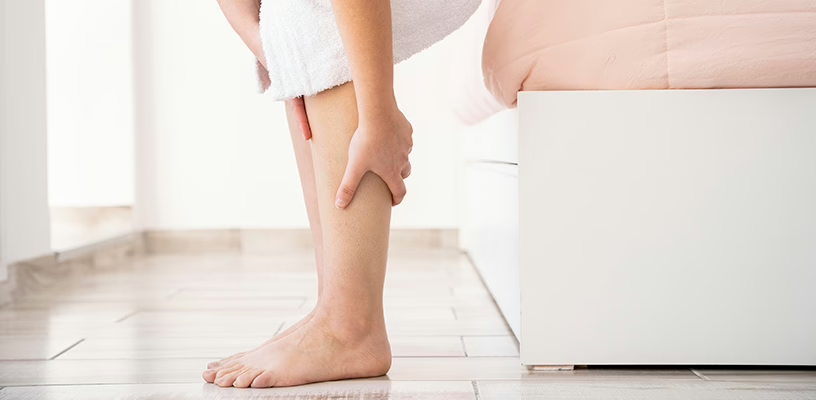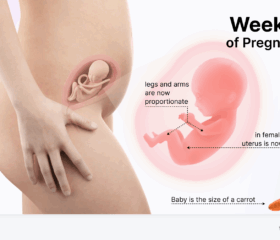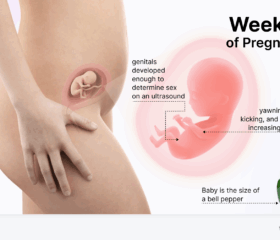Varicose Veins During Pregnancy: What You Need to Know
If you’ve woken up to the sudden appearance of an imposing network of veins snaking their way up your calves, these are probably varicose veins.

Varicose veins are unwelcome visitors, but they’re quite common during pregnancy. Let’s look at what causes them to appear and how to cope with the latest plot twist in your pregnancy adventure.
What are varicose veins?
These swollen veins look like prominent blue or purplish squiggles beneath the skin’s surface. While no space is off-limits, varicose veins usually form in the legs and lower pelvic area. 1
You should mentally separate them from spider veins. The latter are smaller, thread-like veins that may pop up around the same time during pregnancy. While spider veins can be quite visible, they don’t generally bulge like their varicose cousins. 2
Your varicose veins may make your legs ache or cause a burning sensation. You may also encounter symptoms like swelling in the legs and ankles and itching around the veins. This discomfort may increase after prolonged standing or sitting.
Why are varicose veins common during pregnancy?
There’s no single culprit for varicose veins during pregnancy, but one of the most likely causes for them is your increased blood production.
During pregnancy, your blood volume increases, which puts extra pressure on your veins, especially the ones in your legs (as the blood in them has to fight against gravity to get back to your heart). 3
Other possible culprits behind this coordinated varicose assault include: 3
- Your hormones: Progesterone, a pregnancy hormone, relaxes the walls of the blood vessels, leading to swelling. 4
- Uterine pressure: Your expanding uterus will put the squeeze on your inferior vena cava, a large vein on the right side of your body. This pressure affects your leg veins by impeding blood flow.
- Your weight: Those pregnancy pounds will strain your circulatory system and put further pressure on your veins.
- Your genetics: If varicose veins haunt your family (especially if your mother or another close relative suffered from them), this increases your likelihood of developing them during pregnancy.
Varicose veins typically become more noticeable during the second and third trimesters.
How to manage varicose veins during pregnancy
It’s unlikely you’ll completely eliminate swollen varicose veins during your pregnancy. However, there are strategies you can implement to minimize their appearance, alleviate your discomfort, and prevent them from worsening.
One of the best methods is also the simplest: exercise. Getting active is a great way to prevent varicose veins from getting worse (so long as your doctor says you can safely exercise while pregnant). Daily walks, swimming, and other low-impact exercises can help you maintain good circulation.
You should also: 5
- Raise your legs: Whenever you get a chance, use a stool, box, or pillows to prop your feet and legs to the level of your heart or higher. This will take pressure off your leg veins and promote better circulation.
- Try compression stockings: These apply pressure to your veins to improve blood flow and bring down swelling. There are different compression levels available, from support pantyhose to prescription-strength stockings. Put them on before you get out of bed in the morning.
- Avoid standing or sitting for too long: This is especially applicable if your job has you on your feet or at a desk all day. If at all possible, take frequent breaks to elevate your legs or walk around.
- Mind your weight: Follow your doctor’s recommendations for weight gain. Packing on too many pounds strains your circulatory system and increases your risk of developing varicose veins.
- Be a side-sleeper: Avoid bad sleeping positions during pregnancy (i.e., lying flat on your back). Ideally, you’ll join the side-sleeping club. Most experts say the left side is best.
- Not cross your legs: Crossing your legs or ankles when you’re sitting restricts blood flow and can worsen varicose veins. Keep your feet flat on the floor or elevated.
When should you see a doctor about your varicose veins?
Fortunately, varicose veins during pregnancy are more of a nuisance than a serious health concern. However, this doesn’t mean you shouldn’t keep an eye out for potential complications. Call your doctor or midwife for a consultation when you notice these veins appear.
You’ll want to take particular note of symptoms like severe swelling, sores on your legs, and discolored skin. If you have pain, redness, swelling, or tenderness around a varicose vein, these could be signs of a blood clot near the skin’s surface (superficial venous thrombosis). 6
You should call your doctor ASAP if you experience chest pain, coughing (especially with blood), shortness of breath, or rapid heartbeat, as these are the signs of deep vein thrombosis (DVT) or a pulmonary embolism. 7
When will your varicose veins go away?
As with most pregnancy symptoms, varicose veins usually improve or disappear within a few months of childbirth, especially if you didn’t have them before. If they stick around after this period, ask your doctor about postpartum treatment options. Minimally invasive procedures are available to shut down blood flow to the problematic veins.
For better or worse, varicose veins are just another part of the motherhood package. Whether you’re dealing with them now or dreading their eventual arrival, take heart in knowing that this, too, shall pass.
Article Sources
- National Heart, Lung, and Blood Institute. "Varicose Veins" Retrieved June 9, 2025.
- University Hospitals. "Varicose and Spider Veins: What's the Difference – and What To Do" Retrieved June 9, 2025.
- Cedars Sinai. "Hemorrhoids and Varicose Veins in Pregnancy" Retrieved June 9, 2025.
- American Heart Association, Inc.. "Vascular Effects of Progesterone : Role of Cellular Calcium Regulation" Retrieved June 9, 2025.
- Nemours® KidsHealth®. "Why Do Some Pregnant Women Get Varicose Veins?" Retrieved June 9, 2025.
- The Thrombosis Charity. "Thrombosis & Pregnancy" Retrieved June 9, 2025.
- National Health Service. "Deep vein thrombosis in pregnancy" Retrieved June 9, 2025.







